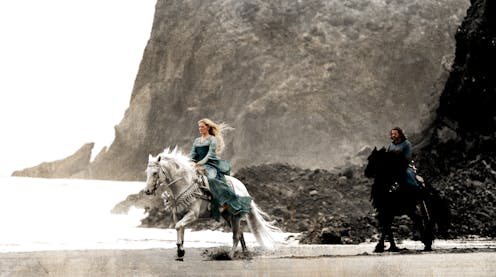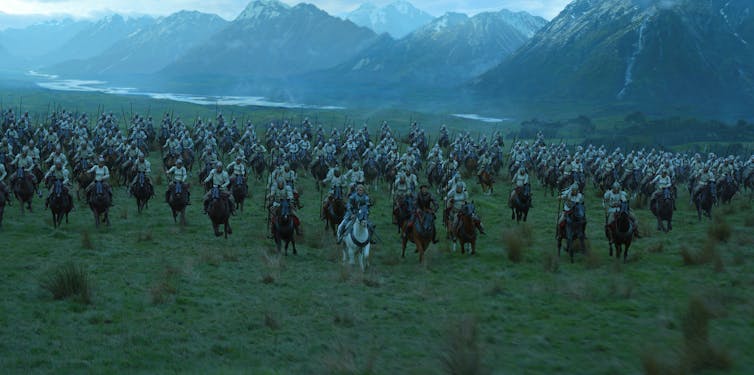Source: The Conversation (Au and NZ) – By Karen Luke, PhD candidate, CQUniversity Australia

Amazon
The recent death of a horse on the set of Amazon’s The Lord of the Rings: The Rings of Power is the latest incident raising questions about how humans use horses for entertainment and sport.
While a statement from producers said the horses’s cardiac arrest occurred before the day’s filming began, animal rights activists PETA used the death to call on all screen producers to replace on-set horses with CGI and mechanical rig alternatives.
The incident feeds into growing public concern about horse welfare on film and TV sets, at the track and in equestrian sports.
But improving horse welfare is about more than just reputation repair – too often it’s about survival for horses and humans.
Horse welfare in film and TV
The riding of a horse over a cliff to its death for the movie Jesse James (1939) led to the establishment of American Humane, which now oversees around 100,000 animals on more than 1,000 productions each year.
While things have improved since the early days of film and television, deaths and mistreatment of horses still occur.
In 1987, on the set of The Man From Snowy River II, a seriously injured horse was killed using the blunt end of an axe.
More recently, the high-profile series Luck, starring Dustin Hoffman, was cancelled following the deaths of three horses.
The good and bad of unprecedented global exposure
In 2021, the Tokyo Olympics beamed to a global audience the excessive whipping and punching of modern pentathlon horse Saint Boy and show jumper Kilkenny’s spectacular nosebleed during the controversial show jumping program.
While the bleed must have been obvious, officials did not intervene to stop the ride.
Confronting images, and the perceived failure of organisers to protect the horses involved, brought into clear and global focus the indisputable welfare issues faced by horses competing at the elite level.
The global outcry led to actress Kaley Cuoco offering to buy Saint Boy and the withdrawal of the equestrian phase from modern pentathlon.
Read more:
‘The Rings of Power’: Every adaptation is re-interpretation so ignore the haters
Risk to humans and horses
Horse welfare does not just impact animals.
Since the 1840s, 873 jockeys are known to have died in race falls in Australia.
Internationally, the sport of eventing (where competitors complete three phases: dressage, show jumping and cross-country) reported 38 rider and 65 horse fatalities during or after competition between 2007-15.
Riding horses is considered one of the most dangerous of all sporting pursuits, and the deaths of riders and jockeys, usually from falls, are common.
Public concern about risk to horses and humans through horse racing and equestrian sports, as well as screen production, also threaten these industries’ social licence.
Better horse welfare is related to better rider safety
Our research offers hope for the horse industry and for those passionate about riding horses.
Last year, we published a paper demonstrating the link between horse welfare and rider safety. We asked riders how they cared for their horses and how their horses behaved when ridden – for example, we wanted to know how often horses were bucking or rearing.
From this information, we calculated a relative welfare score for each horse. We also asked riders about their accidents and injuries.
After analysing the data from over 400 riders, we found the higher the horse welfare score, the fewer accidents and injuries a rider reported.
In a subsequent study, we found horses with better welfare scores are more enjoyable to ride, most likely because they perform better and riders feel more in control, creating a win-win for horses and riders.
Read more:
People hate cruelty to animals, so why do we do it?
Good horse welfare means more than good health
Often good welfare is thought of in terms of an animal being healthy.
While this is part of good welfare, good health alone is not enough – especially for a horse competing at the elite level or taking part in a film.
Horses are neophobes – this means they find new things frightening – so most horses are likely to find a movie set or travelling to a new location stressful. The most up-to-date understanding of welfare tells us that stress and poor mental health means poor animal welfare.
When a horse is stressed or in pain they behave in a very predictable way – they run away, panic, kick out or buck and rear.
Yet, anecdotally and in the media, people seeing a horse behaving in this way often claim the horse is crazy, unpredictable or just plain mean.
More likely, an “unpredictable” horse is suffering from poor welfare.
As part of our research program, we have developed a new framework to help horse owners identify aspects of their care and training that diminish horse welfare.
This information can be used to make modifications to improve horse welfare, and, importantly, can be applied to horses in any equine sector, including racing, sport and film and television.

IMBD
Investing in the future of horses in entertainment and sport
Although a veterinarian assessed the recent horse death on the set of The Rings of Power as “unlikely to be associated with the horse’s participation in the film”, more can be done to protect horses and the industry.
In Australia, no specific standard exists for the use of animals in filmed media, and each state and territory has differing risk management guidelines.
An opportunity now exists for the industry to set a new standard for horse care and training.
An easily executable first step for the industry could be to insist a scientifically trained and credentialed equine behaviour expert be involved in the recruitment and supervision of horse actors and their trainers at all stages of production.
This would ensure horse actors are appropriately trained to be on set and that horses are trained using the most up-to-date ethical methods.
Horse behaviour experts could also help in scene design to minimise horses’ exposure to stressful situations and identify tasks that are incompatible with good horse welfare.
If these suggestions were to be adopted, the film and television industry would be setting the benchmark for horse welfare – and pressure other horse industries to follow suit.
![]()
Karen Luke runs equine welfare and safety consultancy, Just Equestrian Solutions.
– ref. A horse died on the set of The Rings of Power: more needs to be done to ensure the welfare of horses used in entertainment – https://theconversation.com/a-horse-died-on-the-set-of-the-rings-of-power-more-needs-to-be-done-to-ensure-the-welfare-of-horses-used-in-entertainment-202939






